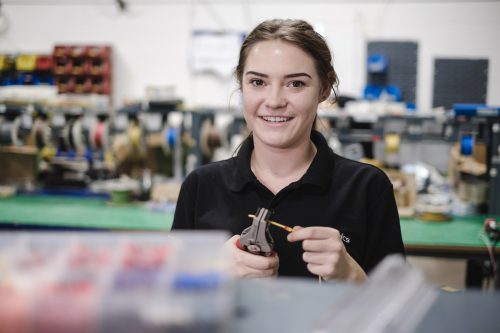Skills support: collaboration in a competitive environment

In the second of a series of articles in partnership with TheBusinessDesk.com supporting the York, North Yorkshire and East Riding Local Enterprise Partnership’s good growth in distinctive places Local Industrial Strategy ambition, Claire Gavaghan, chief executive of Derwent Training Association, shares her thinking around how to boost the regional skills base.
Businesses tell us that they are struggling to find the right employees, yet unemployment across our LEP area is at an all-time low. Skills shortages aren’t a simple challenge to resolve. Investing in skills for high productivity sectors will help to maximise growth in immediate, medium and long term. Yet where to position that investment is a question that can only be answered by understanding the cause of the shortages, recognising potential solutions, and enabling business and education to work hand in hand.
We have an ageing population, and a large proportion of young people, leaving the region to further their careers elsewhere. We want to ensure that we harness the potential of our older, working age population, whilst propagating innovation through the employment and retention of graduates. It’s a chicken and egg scenario. To create opportunities, businesses need to grow, yet they can’t grow without a skilled workforce.
There are two main points. Firstly, times are challenging. Many business leaders predict difficult times ahead. It would be short-sighted for providers to focus solely on larger employers when 97% of businesses in North Yorkshire are SMEs and 85% have less than nine employees. Losing one member of staff reduces the skills base in a company and such a loss significantly impacts on productivity. Therefore, the success of SMEs is of paramount importance with hospitality, healthcare and agriculture areas that could be adversely impacted by the exodus of EU migrants.
Have your say at a Meeting the Productivity Challenge! workshop run by YNYER LEP in York on Monday. Registration is free.
Collectively we must strive for growth even during times of decreased productivity. Businesses must continue to develop skills within its workforce, invest in new recruits to replace significant gaps and capture the expertise of a retiring population within all sectors. Yet are enough SMEs accessing training? Does a family run business in the Dales, a coffee house on the North Yorkshire moors or an independent book shop in York know what training to focus on or how to acquire it? Does most training and grant funding opportunities disproportionately go to larger or savvier employers?
We do not need new ways of working per se. I believe we need to shift the paradigm and the conversation between and expectations of employers and education providers in order to create collaboration within the naturally competitive environment. We need to extend into the harder to reach places to address skills shortages. Training providers cannot wait for businesses to come to them or rely on stagnant marketing routes when SMEs are too busy staying in business to look for training opportunities. Networks need to get closer to SMEs, using funds to go to towns such as Malton and Hawes, leafleting directly to businesses to come together to train and develop. We must develop conversations around the importance of critical skills, often called soft or life skills, and discussions about shared services around clusters of SMEs.
Secondly, education providers deliver the majority of training to businesses, but they are profit making businesses themselves. The relationship between the trainers and employers must be equal. In the best examples, they work together within establish relationships, are truthful with each other, disagree at times, say no when it is right to do so, extend existing networks to include others and when one partner cannot or should not offer or fulfil a service, work to introduce a suitable alternative third party. In the worst examples, employers expect training for free, expect providers to step outside the bounds of regulations that encapsulate delivery and providers make commitments they know they cannot deliver.
The latter examples create blockages in addressing skill shortages and hinder productivity and growth. It must stop. We need to reflect on the levels of honesty and trust in our networks and alliances, move forward with a refreshed understanding of the pressures all businesses face and use networks to develop our region for the good of all who live and work here.
Do you agree? Get involved by registering for the event or by giving your view on the YNYER LEP website.








